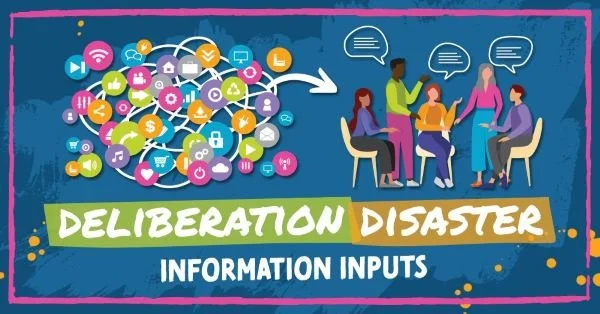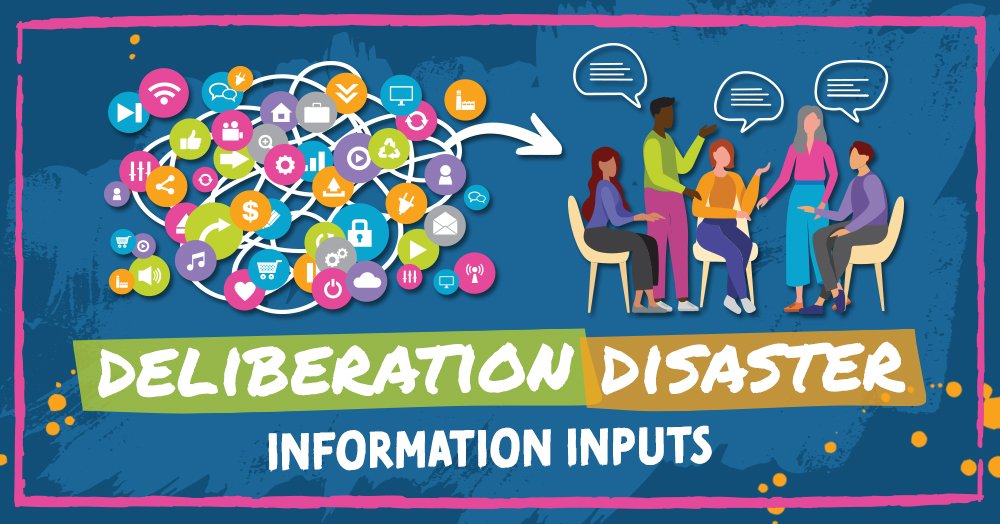Information inputs. Sounds simple enough. If you’re prepping for a deliberative process, you just pull together a whole heap of content about the topic, throw in every relevant report or strategy you have on hand and hope for the best. Right?
Not exactly.
In any engagement process, good information inputs are key. People simply can’t participate meaningfully if they aren’t across all the relevant information or don’t have access to what they need.
In a deliberative engagement process, this is even more crucial, as the deliberating group is expected to weigh up all sides of an issue, consider multiple perspectives, understand the complexities and balance the trade-offs and consequences involved with each option or solution. That’s a big job!
Because deliberative processes are a big investment, it can be tempting to cut corners, and information inputs are an area where we do see mistakes made.
In this second article in our new series on ‘deliberation disasters’, we’re going to:
list the biggest mistakes we see made
explore the consequences of getting it wrong
walk you through seven top tips for getting information inputs right.
Let’s go!
THE PRINCIPLE OF INFORMATION
One of the principles underpinning deliberative processes is built around information. We’ve described it this way in our book Facilitating Deliberation – a Practical Guide:
“Group members should be provided with detailed and balanced information on the deliberation’s topic from multiple diverse sources. This information should be in a range of formats (e.g. written, verbal) and should explain the dilemmas or trade-offs within the remit’s question.” - Facilitating Deliberation, A Practical Guide
This means that the information isn’t biased towards one point of view. It also involves the deliberating group being given the opportunity to ask for additional information and hear from speakers they have chosen and trust.
This ensures that the group’s recommendations are based on facts and a thorough understanding of the topic from different perspectives, rather than simply their own opinions or preferences.
INFORMATION DISASTERS
what can go wrong?
Here are some of the common errors we see made.
More isn’t always more! Overwhelming participants with too much information or lots of irrelevant information they have to wade through.
Providing too little information and expecting the group to be able to make informed decisions.
Suppressing or hiding information that the organisation is uncomfortable with sharing or feels is too complex or sensitive for the public to understand or see.
Providing unbalanced or biased information that fails to cover all sides of an issue, leans towards one perspective or favours only some perspectives.
Preparing promotional information that contains a self-congratulatory tone and is aimed at ‘winning over’ the group.
Developing inaccessible information that doesn’t cater to all abilities in the group.
Writing in a way that’s difficult to understand - text-heavy, complicated, jargonistic and poorly expressed information.
Preventing the group from requesting further information and only providing handpicked information and/or speakers the organisation has selected.
Being unresponsive to information requests or questions from the group.
POSSIBLE CONSEQUENCES
What’s the worst that can happen if you get it wrong? Here are a few examples.
The deliberating group’s discussion is uninformed and lacks balance or consideration of multiple perspectives. The needs of all impacted and possible trade-offs aren’t considered.
The process results in less useful and less balanced outputs that don’t reflect consideration of all of the complexities of the issue and may not address the issue in the way decision-makers need.
The participants are frustrated and feel they can’t do their job to the level required. This can result in participant drop-off or reduced levels of engagement.
Participant and wider community trust in the organisation and the process is reduced.
External stakeholders such as the media, community groups or politicians throw around accusations of a biased process and claim that all sides of the problem weren’t presented.
If your process is regulated by a third party, your approach is ‘downgraded’, dismissed or publicly criticised as not meeting the requirements of the legislation or policy.
The final decision lacks social licence and is not supported by the community or stakeholders.
GETTING ON TRACK WITH INFORMATION INPUTS
Here are seven of our best tips for preparing information inputs for a deliberative process.
1. Put it to the test.
Ask yourself, does the information we are providing ‘go to the heart’ of the issue, consider all perspectives, enable the participants to grapple with the complexities involved and weigh up all the trade-offs associated with possible solutions?
2. Make it visual and accessible.
Ensure you have multiple formats available for participants with different preferences and abilities and use graphics, videos, infographics and other visual content to help people quickly understand complex information.
3. Review for clarity and conciseness.
Content should be crystal clear, but not so short and edited that it is no longer useful. Possibly ask ‘outside eyes’, maybe even an end user themselves, to review the information for clarity.
4. Work with internal stakeholders
to get everyone comfortable with bravely communicating all the information on an issue, even if some of it doesn’t look great for the organisation.
5. Be responsive and adaptive.
Respond to requests for further information, answer questions posed by the group and edit and amend information throughout the process to flex around the needs of everyone involved.
6. Allow time in the deliberative process
for the group to work through all the information, ask questions and select their own speakers without any influence from the organisation.
7. Resist the temptation to market yourselves
It’s a common error to develop content that reads like a promotional campaign for the organisation. Focus instead on providing useful information that supports meaningful participation over glossy marketing.
FURTHER READING AND RESOURCES
Looking for more information about information? Check out this free download we created for engagement processes (of all kinds) about getting information inputs right.
Keen for more free tips and resources? Head on over to our deliberation resource hub where you can access lots of free stuff.
Wanting to delve deeper into the complexities of recruitment and looking for a how-to practical guide for deliberation? Our big book – Facilitating Deliberation A Practical Guide – is available now.
Want hands on learning and ready to upskill? Browse our range of MosaicLab Academy deliberation courses.
Check out our first article in this series - When deliberation goes wrong: Recruitment.
stay in the know + get lots of free engagement stuff
We share the tips, ideas, news , free resources and more through our monthly e-newsletter the Discussion.











